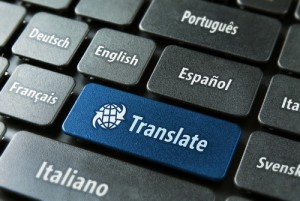Tag: FCPA
2014 Translation Industry Trends

The translation and localization industry’s growth continues its climb well in 2014, staying ahead of the global economic growth forecasts at a rate of 5%. Much of this development can be attributed to the need for businesses to engage emerging local markets. Here at Morningside, we find these trends corroborated by the evolving nature of project requests.
Increasingly the BRIC countries, namely Brazil, Russia, India, and China, are asserting themselves as pivotal players in today’s global economy. This geographic shift in economic activity has led to heavier involvement in international legal disputes and, consequently, a larger need for the translation industry. Matters relating to the FCPA, or Foreign Corrupt Practices Act, have increasingly called upon LSPs for translations of documents from newspaper articles to email exchanges. Intellectual Property matters in particular have felt the effects of this power shift. Brazil, Russia, Japan and China have become standard foreign filing destinations. Additionally, Korea, Mexico, Indonesia, and Ukraine are experiencing surges in patent prosecution.
Continuing beyond the BRIC, countries such as South Korea and Indonesia are beginning to challenge traditional leaders in manufacturing such as Japan and Germany. Increases in global competition have spilled over into the courtrooms, driving demands for legal translations and interpretations up.
Southeast Asia is more commonly featured as the backdrop to medical and pharmaceutical industry expansion. As more clinical trials are conducted abroad, the need for accurate, technical translations rises with it. Just last month, Morningside participated in the 2014 Drug Information Association (DIA) Conference in San Diego in response to our increased involvement in medical translations for clinical trials and regulatory work.
Domestically, the Department of Justice has pursued many White Collar and Antitrust cases which can involve multiple languages—most commonly Korean, Japanese, and Chinese. Antitrust cases in particular are responsible for a large portion of the rising demand for qualified interpreters.
Morningside continues to stay abreast of these global activities by engaging new verticals and expanding language coverage to match shifting trends. We have increased our presence in the medical field and continue to expand our partnerships in the legal industry. Furthermore, in response to shifting language trends, Morningside has increased coverage of language combinations such as Indonesian and Japanese in order to meet evolving needs.
Get the latest insights delivered to your inbox
FCPA Translation

The need for translations related to the U.S. Foreign Corrupt Practices Act (FCPA) have grown substantially in recent years. For most companies, FCPA translation is limited to translating corporate compliance policies into various languages for overseas employees and offices. The importance of translating these policies clearly and accurately should not be underestimated.
But for law firms defending their clients during an FCPA investigation, hundreds and possibly thousands of foreign language documents may need to be translated. The cost for translating these documents can be exponentially high, and relying on machine translations alone is a risky strategy.
Your best bet for FCPA translation is relying on a multi-pronged approach that relies on 1) filtering techniques like foreign language keyword search to remove irrelevant documents from the data set 2) machine translations to get the “gist” of what each document contains 3) document summaries to determine if a full translation is needed 4) certified word-for-word translation for documents that must be clearly understood and/or submitted to the Department of Justice or SEC.
A multi-stage process for FCPA translation that filters down the cache of foreign language documents not only helps lower costs but also speeds up review time. It’s also critical to use translators that are experts in the field and familiar with local terminology. For example, French words associated or used as slang for bribery or “pay-off” are different in Morocco than in France. The translator should be familiar with these regional differences.
Partnering with a translation company with significant FCPA translation experience should help provide you with strategies for containing costs while still ensuring accurate, reliable translations to help you build the strongest case possible.
Get the latest insights delivered to your inbox
Foreign Language eDiscovery & Litigation Support

The increase in international litigation and investigations means that more and more e-discovery projects now include foreign language data. Even when document collection takes place exclusively in the United States, it is not uncommon to find a number of foreign language documents included in the mix of potentially responsive data. Multilingual documents add a layer of complexity to e-discovery projects, and when not properly handled can increase costs substantially.
Most e-discovery and litigation support service providers are not really equipped to handle foreign language data, and those that are rarely have the linguistic expertise and translation tools to process, review, and translate the relevant documents into English in an efficient and cost-effective way. Relying on multilingual attorneys to review all the foreign language documents can be prohibitively expensive; obtaining word-for-word translations of all the documents is more expensive still. And trying to decipher hundreds of pages of machine translated text is not only time-consuming (and therefore expensive) but also yields inaccurate results since the quality of most machine translations is still quite poor.
The ideal solution is to integrate professional language services into the e-discovery workflow, by partnering with a company that offers legal translation services as well as e-discovery support. Trained linguists working in tandem with the e-discovery team can help identify, process, and review foreign language documents, and reduce the document collection so that only relevant and responsive documents are translated. They can help ensure that documents are correctly identified by language and that keyword searches are performed efficiently. For example, when performing keyword searches on French documents collected during an FCPA investigation, it’s not enough to simply translate search terms like “bribe” and “government official” into French. A smart search will include other French words and expressions with similar meanings. An interactive process that includes both translators and the case team can help identify all relevant documents, and avoid unnecessary translations.
To sum up, the best approach to multilingual e-discovery is a proactive one: instead of waiting for the e-discovery process to take its course and then dealing with foreign language documents, partner with a solution provider that has both e-discovery expertise as well as translation expertise. This will help reduce the number of documents that ultimately need to be translated, and also help you avoid numerous headaches along the way.
For information on our foreign language e-discovery services, please click here.
Get the latest insights delivered to your inbox
Global Law Firms, Emerging Markets, and Professional Legal Translation

An article from the July 7th edition of the Economist discusses how British law firms are expanding their global footprint. Unlike Dewey & Leboeuf which tried to grow too fast and ended up going bankrupt, London’s top 5 law firms are growing their revenues and profits at an impressive and steady pace and this is largely coming from growth in emerging markets. What could that mean in terms of professional legal translation?
Allen & Overy has recently opened up offices in Jakarta and Vietnam. Clifford Chance is bullish on China, the Middle East, and Brazil. And while the large number of Western firms moving into China has led to lower fees due to competition, China is still a hugely important and growing market for American and British law firms.
In terms of professional legal translation, more law firms overseas means a growing need for talented legal translators and multilingual support for global casework. And as global businesses themselves, law firms must prove compliance with the Foreign Corrupt Practices Act (FCPA) related to their foreign operations, which requires translating documents from various foreign offices into English.
No matter how you look at it law firms conducting business in multiple regions will require professional legal translation. Legal translation can present different challenges related to cost and efficiency. For high volumes of translation work, options including machine translation, online sifting, and document review should all be considered. Overcoming those challenges requires the right mix of technological and human support, and the right translation company to help guide you through the process.

